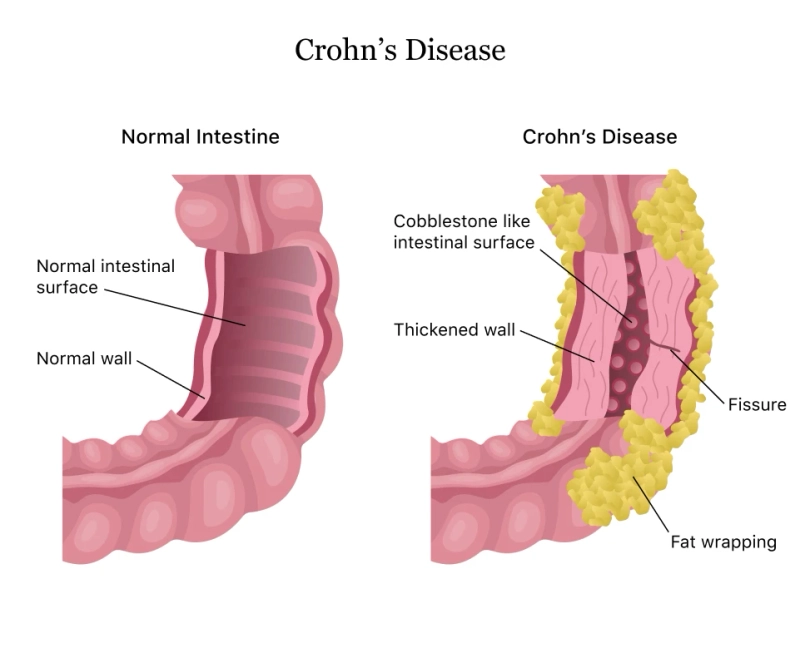Introduction:
is a chronic inflammatory bowel condition that affects millions of people worldwide. It is characterized by inflammation of the digestive tract, causing symptoms such as abdominal pain, diarrhea, fatigue, and weight loss. While there is no cure for Crohn's disease, various treatment options are available to manage symptoms and improve quality of life. In recent years, cannabidiol (CBD), a non-intoxicating compound derived from the cannabis plant, has gained attention for its potential therapeutic effects. Some individuals with Crohn's disease have turned to CBD as a complementary or alternative approach to managing their Crohn’s disease symptoms. In this blog post, we will explore the potential benefits of using CBD for Crohn's disease, as well as important considerations and precautions to keep in mind.
Understanding Crohn's Disease:Crohn's disease is an autoimmune condition in which the immune system mistakenly attacks the digestive tract, causing inflammation and damage. The exact cause of Crohn's disease is unknown, but it is thought to involve a combination of genetic, environmental, and immune system factors.
The Endocannabinoid System and CBD:The endocannabinoid system (ECS) is a complex network of receptors, endocannabinoids (naturally occurring cannabinoids produced by the body), and enzymes. The ECS plays a role in regulating various physiological processes, including inflammation, pain, and immune response. CBD interacts with the ECS, potentially influencing these processes and exerting therapeutic effects.
III. Potential Benefits of CBD for Crohn's Disease:
Anti-inflammatory Properties:CBD has been found to have anti-inflammatory properties, which may help reduce the inflammation in the digestive tract associated with Crohn's disease. By modulating the immune response, CBD may help alleviate symptoms such as abdominal pain and diarrhea.
Pain Relief:Crohn's disease can cause significant abdominal pain and discomfort. CBD has shown potential as a pain-relieving agent, possibly by interacting with pain receptors and reducing inflammation-induced pain.
Appetite Stimulation:Loss of appetite and weight loss are common in Crohn's disease. CBD has been reported to have appetite-stimulating effects, which may help individuals with Crohn's disease regain their appetite and maintain a healthy weight.
Reduction of Anxiety and Stress:Living with a chronic condition like Crohn's disease can be stressful and anxiety-inducing. CBD has been studied for its potential anxiolytic and stress-reducing effects, which may provide relief for individuals with Crohn's disease.
Considerations and Precautions:Lack of Regulation and Quality Control:The CBD market is currently unregulated, which means that the quality and purity of CBD products can vary significantly. It is important to choose CBD products from reputable sources and ensure that they undergo third-party testing for potency and contaminants.
Potential Drug Interactions:CBD can interact with certain medications by inhibiting enzymes responsible for metabolizing drugs in the liver. This can lead to higher levels of the medication in the bloodstream and increase the risk of side effects. If you are taking any medications, it is essential to consult with a healthcare professional before using CBD.
Individual Variations and Dosage:The optimal dosage of CBD for Crohn's disease may vary from person to person. It is advisable to start with a low dosage and gradually increase it while monitoring its effects. Consulting with a healthcare professional experienced in CBD use can help determine the appropriate dosage for your specific needs.
Legal Considerations:The legal status of CBD varies by country and region. Before purchasing or using CBD products, it is essential to understand the legal regulations in your area to ensure compliance.
Other Treatment Options for Crohn's Disease:While CBD shows promise as a potential complementary therapy for Crohn's disease, it is important to note that it is not a substitute for conventional medical treatments. Current Crohn’s disease treatment options for Crohn's disease may include anti-inflammatory medications, immune system modulators, and surgery in severe cases. These treatments should be discussed with a healthcare professional experienced in managing Crohn's disease.
Conclusion:
CBD has gained significant attention for its potential therapeutic effects, which include its anti-inflammatory properties, pain-relieving benefits, and potential for reducing anxiety and stress. While the research on CBD specifically for Crohn's disease is currently limited, preliminary studies and anecdotal evidence suggest that CBD may offer some benefits in managing the symptoms associated with this inflammatory bowel condition.
However, it is essential to approach the use of CBD for Crohn's disease with caution and take into consideration individual variations, potential drug interactions, and the lack of regulation in the CBD market. Each person may respond differently to CBD, and its effects can vary depending on factors such as dosage, frequency, and the specific formulation used.
Moreover, CBD can interact with certain medications, as it inhibits enzymes responsible for metabolizing drugs in the liver. This can lead to higher levels of the medication in the bloodstream and increase the risk of side effects. It is crucial to consult with a healthcare professional experienced in managing Crohn's disease and knowledgeable about CBD use. They can provide personalized guidance and help determine the most appropriate and effective treatment plan for your specific needs.
Furthermore, it is important to note that the CBD market currently lacks regulation, resulting in variations in the quality and purity of CBD products. It is advisable to choose CBD products from reputable sources that undergo third-party testing for potency and contaminants. This ensures that you are using a high-quality product that is safe and reliable.
In conclusion, while CBD shows promise as a potential complementary therapy for managing Crohn's disease symptoms, it is crucial to approach its use with caution. Consultation with a healthcare professional is essential to ensure the appropriate and safe use of CBD, taking into account individual factors and potential interactions with other medications. With the guidance of a knowledgeable professional, you can make informed decisions regarding CBD use as part of your comprehensive treatment plan for Crohn's disease.



